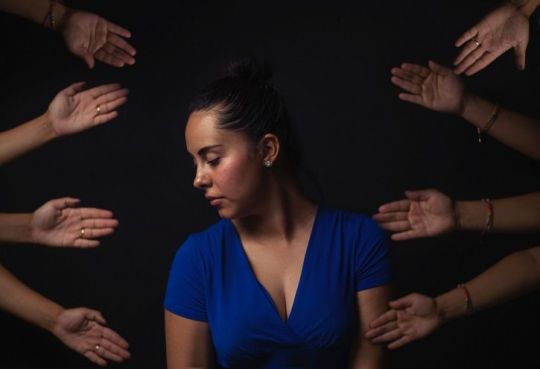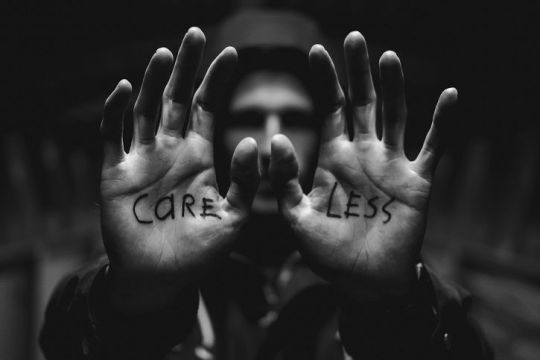Science Of Apologies: Why Some People Find It Hard To Say Sorry Even When They Know They Should
by Neeraj Bisaria SEO Exec.One of the many things we learn as growing is apologising for any wrongdoing on our part. It's not too uncommon to see other kids learning this too. Be it at the playground, the mall or at school - there's always a parent gently reprimanding their child and following it up with 'say sorry.'
How is it then that growing up, some of us find it so difficult to say such a simple word? Even something like someone bumping into you at a crowded metro station doesn't illicit an apology, forget a genuine one. At most, all you get is a questioning look and an impatient 'hmph!' It sucks to be the person who is owed an apology, especially nowadays. Those are not easy to come by.

Unsplash/Zulmaury Saavedra
I'd like to think we all attach a lot of meaning and sincerity to the word 'sorry' (and we should), and may be that is precisely why some of have a tough time apologising. May be.
For a person on the receiving end of the apology, any hesitation or reluctance on the part of the wrongdoer may come across as pride or something stemming from ego but the psychology of it runs deeper. According to Psychology Today,
'Refusing to apologize often reflects efforts to protect a fragile sense of self.'

unsplash/Cristian Newman
Situations can vary, and so can corresponding apologies. We blurt out a quick "sorry" when we almost run into someone. We say 'Oh, I'm sorry,' when after using a colleague pen we forget to return it. The sincerest of apologies, and we've all done it, comes when serious emotional pain is involved. But, according to Psychology Today, and you'll agree, the one thing that is common to all three situations is that a person who is ever-ready with excuses never runs out of them. Even in the serious situations, there is denial and... excuses.
So, why won't people apologise even when they know they should? Here are a few reasons why non-apologists behave the way they do:
1. The fear of rejection

Unsplash/Taya Iv
What if you're not forgiven? If you're not forgiven then you're stuck with the guilt forever.
2. A sign of weakness
Some non-apologists feel that only losers apologise and that automatically makes the person receiving the apology, a winner. May be these people were heavily reprimanded as kids and, so, avoiding apologies helps them avoid the harsh feelings they experienced in those moments. A fragile sense of self is the culprit here, and, as a result, apologising and opening up to someone seems almost threatening to them.
3. Vulnerability

unsplash/Ian Espinosa
Saying they're sorry can make some people feel vulnerable, and at times, they may even see it as losing power because for these people it's almost like they're admitting they're incompetent, incapable and inadequate. Apologising, for these people, automatically means they're taking full responsibility for any wrongdoing whereas that shouldn't be the case.
4. The 'power' of denial
Some feel that if they don't admit to a wrongdoing, it's almost as if it didn't happen. Some others feels as if apologising won't undo the damage, and rarely see the point. The fact that they feel all wrongdoings cannot be forgiven comes in to play here. But we forget that the person who was wronged gets to decide whether to forgive or not.
5. Lack of any real concern for the person wronged

unsplash/Mitchel Lensink
Empathy becomes real only when you really value your relationship with the person you've wronged. If empathy and sympathy exists, apologising comes easy. If not, it doesn't come at all.
6. Gateway to yet more conflict
So you apologise and take the hit. The next and only step is opening the door to more conflict. Non-apologists fear they're only going to attract more blame.
7. A seemingly better handle on all emotions

unsplash/Sam Burriss
Non-apologists are more comfortable with emotions like anger and irritability; so, for someone like them, baring your emotions and opening up to someone could tear down the wall of defence they've carefully built for themselves over the years. This assumption is wrong. A meaningful apology can be quite therapeutic and cathartic for the apologiser.
8. A 'victim mentality' or the 'martyr complex'
People with this acquired personality trait often see themselves as the victim. A article on Step to Health says, 'Since they always want to be pitied, they may cry or get angry so that the “alleged” aggressor feels guilty and apologizes' and not the other way round. They rarely their fault and 'their mechanism for manipulation is so effective that they can always find a way to justify their behavior and be the “good guy” in the end.'
Why saying sorry can be a good thing

unsplash/Levi Guzman
"Love means never having to say you're sorry." Um-no. If anything, to have a deep and meaningful relationship, one need not be scared of apologising. Imagine an apology to be the soft conditioner all healthy and meaningful relationships need. After all, all humans need the relationships they create to thrive in life. Better yet, an apology reinstates trust and it's a good way of letting the other person see you won't make the same mistake again. It lets them know they mean something to you. The best part: an apology can show how much bigger you are as a person, and according to Very Well Mind, 'it puts the focus on your better virtues, rather than on your worst mistakes.'
By: Tanya Sirohi
Source: Indiatimes
Sponsor Ads
Created on Apr 12th 2018 01:48. Viewed 228 times.



